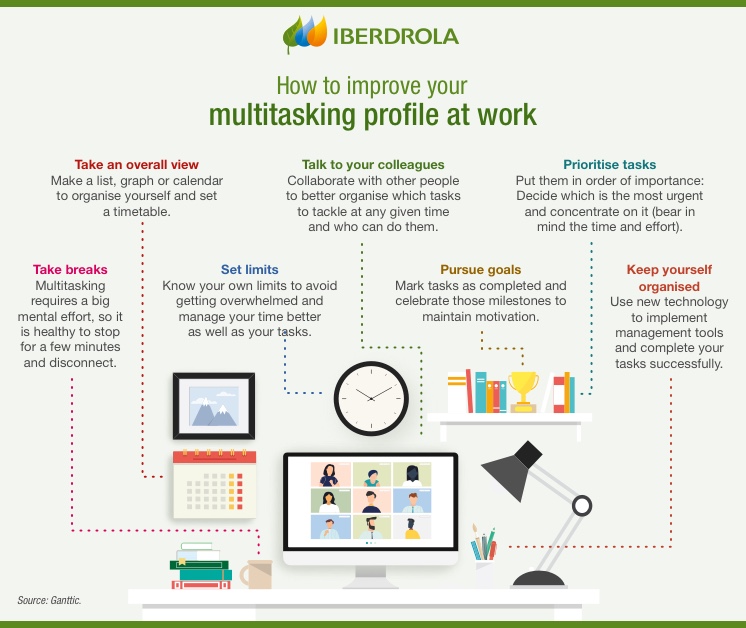Multitasking
What is multitasking and what are its main pros and cons?
The multitasking person can add value to a project. This is why many companies are choosing profiles that can assume a variety of functions, responsibilities and roles. However, it is not easy to perform several tasks at once efficiently, just as one person cannot cover the work of several. Below, we review the pros and cons of multitasking.

The spectacular development of technology in recent decades has changed working practices in almost every professional sector. In fact, most people feel that they have to do an endless series of tasks all at once on a daily basis to meet the speed and efficiency demands of the computerised era.
What does multitasking mean
A multitasker is someone who can perform two or more tasks simultaneously and effectively, which - apart from the obvious differences - is similar to what a computer does. The concept does indeed come from the realms of technology, where it is used to refer to operating systems that are capable of executing multiple tasks at the same time. However, the key question is: can a person really be a multitasker?
For most scientists, the answer is no. So much so that, according to doctor René Marois, an expert in neuroscience whose work focuses on understanding the human neuronal attention base, "our brains do not handle multitasking situations well. As soon as two tasks require our attention, productivity suffers". This opinion has been shared for some years by institutions such as Stanford University and the American Psychological Association (APA).
"Our brains do not handle multitasking situations well. As soon as two tasks require our attention, productivity suffers"
René Marois, expert in neuroscience
What we call multitasking, therefore, is in reality the ability to move more or less quickly from one task to another, and this requires two essential conditions: That one of the tasks needs to be automatic, like walking or eating, and that they both need different cerebral processes, for example answering the phone and writing at the same time.
However, on the other side of the coin there are people who maintain that it is possible to be, or at least seem to be, multitasking. A study External link, opens in new window. published by the Association for Psychological Science (APS) concluded that regardless of whether people are actually handling several tasks or not, the mere fact that they perceive this activity as multitasking has a positive effect on their performance.
External link, opens in new window. published by the Association for Psychological Science (APS) concluded that regardless of whether people are actually handling several tasks or not, the mere fact that they perceive this activity as multitasking has a positive effect on their performance.
How to be a multitasker
The business perspective offers a different view: multitasking understood as the ability to adapt to all types of environment within a company and effectively undertake different activities within a set timeframe. Indeed, many companies look for multitasking profiles to improve their productivity.
From this different perspective, you can not only be multitasking but this ability can also be taught — something that is easier in fluid organisations, that favour agility and flexibility in their working practices —. Let's have a look at some tips on this subject:

Pros and cons of multitasking
Benefits of multitasking
Better time-management. Being quicker and more efficient throughout the working day increases our performance and the number of tasks completed.
Higher productivity. If the tasks to be done are organised and carried out correctly, the volume of work that can be taken on increases.
Better reaction to complex tasks. When someone develops the habit of being able to do several tasks at once, their predisposition to tackle this type of task is greater.
Increased responsibilities. Developing a multitasking profile offers workers a wider outlook and enables them to apply for promotions and leadership positions.
Disadvantages of multitasking
Lower efficiency. As we have already said, a number of scientific studies show that the brain struggles to distinguish between what is urgent, important or necessary.
Memory can become compromised. According to a report from the University of California, it can reduce the ability to remember the tasks that are being done.
Greater risk of errors. Having to pay attention to several things at once means that the powers of concentration diminish and that can lead to more mistakes.
Heightened stress levels. When too many tasks are attempted, it produces a sense of panic, of not having time to do everything, which can cause stress.




